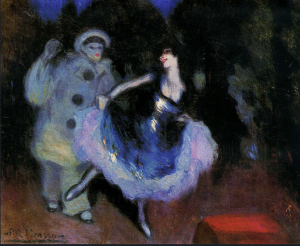 This story was strange from the very beginning, which made it much more intriguing, and as a reader, I wanted to keep reading. Early on we find that the story is from the perspective of Monsieur Vachon, who is an artist attempting to sell a painting to a man named Colonel Leclerc using his female associate, Solange. He is very possessive of her, and is not comfortable with letting her interact with Leclerc due to his clear attraction to her:
This story was strange from the very beginning, which made it much more intriguing, and as a reader, I wanted to keep reading. Early on we find that the story is from the perspective of Monsieur Vachon, who is an artist attempting to sell a painting to a man named Colonel Leclerc using his female associate, Solange. He is very possessive of her, and is not comfortable with letting her interact with Leclerc due to his clear attraction to her:
“I could not bear to see her play at being the woman she once was. I’d rescued that woman from the Place Pigalle and made her my model. I’d redeemed her nakedness with my art. But Leclerc would rather buy her than one of my paintings”(Butler 41).
This egotistical and possessive mindset in regards to Solange is great foreshadowing for the events that happen later on in the story, though it is not the main thing that stands out from the beginning of this story. There is, after all, a clown present that no one interacts with except for Vachon. The interaction that he has with the clown, Pierrot, is mostly one sided; Pierrot never really talks, but when he does it is raspy and gravelly – practically nonexistent. Through this interaction, it is revealed that Vachon’s father murdered his wife after seeing a performance done by a particular clown; Vachon remembers that he saw his father for the last time that night at the theater.
The sudden remembrance of this memory sends Vachon into a downward spiral, and he goes upstairs to find Solange with Leclerc. And though he is mad at Leclerc, all of his emotions are directed at Solange, specifically after Leclerc says “She has seduced me” (Butler 49). Soon after, Vachon murders Solange in the same way that his mother was.
Vachon does not take his anger out on Leclerc because of his past trauma; he immediately takes to heart the idea of it being Solange’s fault because of his possessiveness of her, and the paranoia that accompanies it. It was established early on that he did not like her interacting with Leclerc, and thought of her as his muse only; her betrayal sets him even more over the edge. That being said, the reveal at the end of this story connects all of these things: the clown is actually Vachon’s father. His “hidden” presence in this story and the interactions that he has with Vachon suggests the continuation of generational trauma and violence. Vachon has a realization of this at the very end, in which he fully takes in what has happened, saying “Father… What have we done” (Butler 50).
I think you bring up some really good points. This story both points out his possessive and egotistical nature that can drive people away, but this story also points out the horrible thing that it is to have an affair. We see the danger with this possessiveness come out when he ends up murdering her, and it is essentially a rude awakening of something we had, sadly, been seeing all along.